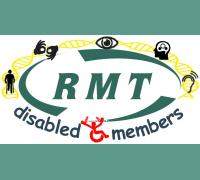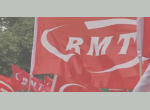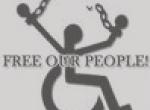Saturday, 3rd of October '20
Similar topics:
Resolutions passed at RMT Disabled Members Conference
RMT's 2020 Disabled Members' Conference took place on Zoom on 2 October, and passed the following resolutions:
BLUE BADGE PARKING AT RAILWAY STATIONS
(South West Midlands branch)
(South West Midlands branch)
The Conference notes & feels the TOCs are unfairly discriminating against ALL disabled car drivers who hold a valid Blue Badge Pass when parking at Railway Stations. The TOCs who do not charge for Blue Badge holders are very few and the rest charge without any discount. Seeing as Disabled Passengers can obtain a Disabled Person Railcard (1/3 off) for train tickets only. Only for them to be stung when it comes to parking. Which in some cases outweigh the saving obtained for train tickets.
This Conference asks the union to put pressure on TOC’s to STOP this practice which discriminates against those with disabilities and are fortunate to drive. We also ask the union to put pressure on the DfT, RDG, ORR & passenger focus groups to all join together and stamp out this National geographical stealth tax to ALL disabled Blue Badge Holders. To say equality, diversity & inclusion is the big selling point from the Government downwards is farcical.
TRAVEL SCHEMES FOR THOSE WITH ILL-HEALTH RETIREMENT OR 25 YEARS SERVICE
(South West Midlands branch)
(South West Midlands branch)
The Conference notes & feels that the long service award and travel schemes Network Rail (NR) need to be updated when members retire on ill health grounds and also several options should be available to ALL staff once served a minimum 25yrs service.
Options wanted:
· ill health retirement any age / service length- 1st class travel (boxes / pass).
· 25yr long service- 1st class travel (boxes / pass).
This Conference asks the union to put pressure on the RDG (Rail Delivery Group) to amend policies that discriminate against those with disabilities. Especially as NR policy is to provide 1st class travel to ALL employees when travelling on business who own a Blue Badge.
To say equality, diversity & inclusion is the big selling point from the Government downwards is scandalous.
DISABLED WORKERS AND ANTI-UNION LAWS
(Finsbury Park branch)
(Finsbury Park branch)
This conference believes that Britain’s anti-union laws hamper disabled workers in fighting for our rights, including by:
1. restricting what we are allowed to take action over to narrowly-defined ‘trade disputes’, barring strikes against wider social and political issues that affect disabled people
2. requiring unions to follow a lengthy process before calling action, which can allow employers to go ahead with their attack before we are allowed to take action against it
3. insisting that industrial action ballots be conducted solely by post, placing discriminatory barriers in the way of disabled people voting
4. requiring members to opt in to the union’s political fund, in the hope of starving unions of money that they can spend on political campaigning and representation, including on disability rights.
We deplore the Tory government’s plan to introduce a new anti-union law, to require that a ‘minimum service’ runs during transport strikes. We note that this is promoted by referring to the rights of passengers, including disabled passengers. We are appalled that the Tories, with their record of systematic attacks on disabled people, would cynically use disabled people as a pretext to restrict the right to strike. We affirm that it is in the interests of disabled people to defend the right to strike, and we will resist attempts to divide transport workers and passengers against each other.
We welcome the policies passed by TUC Disabled Workers’ Conference and Labour Party conference for the repeal of all anti-union laws. We welcome, and will take part in, campaigning by Free Our Unions and the TUC Disabled Workers’ Committee on this issue, and against the proposed new law.
We resolve to hold a fringe meeting on this subject at TUC Disabled Workers’ Conference in March.
COVID-19, DISABLED MEMBERS AND CARERS
(Neasden branch)
(Neasden branch)
Disabled Members Conference notes the resolution passed by the Disabled Members’ Advisory Committee on the subject of Covid-19 at its June 2020 meeting.
Building on this, we note:
1. That some Covid patients will have long-term damage to their health
2. That transport workplaces often have poor air quality, which will present a barrier to people with respiratory damage
3. That some members will have more demanding caring responsibilities as a consequence of Covid-19
4. That disabled people who can not wear face coverings have faced abuse while travelling on public transport
We further note the potentially devastating impact of renewed austerity in the wake of Covid-19 on disabled people, including
1. Threats to scrap accessibility improvement projects
2. Threats to restrict entitlement to free travel for disabled people
3. The suspension of employability schemes for disabled people, such as TfL’s Steps Into Work
4. Fears that disabled workers will be first in line for redundancy
We resolve to include campaigning on the issues in this and the DMAC resolution in our plan of activities for the coming year.
We also ask the union to include in RMT News the testimonies of disabled workers about the impact of Covid that was submitted earlier this year.
DISABILITY TRAINING
(Neasden branch)
(Neasden branch)
We note that:
1. The union’s Disability, Autism and Cancer in the Workplace training courses are not currently scheduled to run
2. The Disabled Members’ Advisory Committee has asked for these courses to be run in regions (when feasible and safe) and online
We resolve that the union run the Disability, Autism and Cancer in the Workplace courses online, and schedule them to run in regions when this is feasible and safe.
SUNFLOWER LANYARDS
(Finsbury Park branch)
(Finsbury Park branch)
We note that:
1. several transport operators are using sunflower lanyards for people with hidden conditions to indicate that they may need assistance
2. many people with hidden conditions have welcomed the sunflower lanyard scheme, although some have expressed concerns that it labels people and may be used as a pretext to not make more wide-ranging accessibility improvements.
We believe that:
1. the lanyards have the potential to be very helpful to some people
2. however, if transport employers introduce the lanyards without having enough staff, with adequate training, to deliver the assistance that people need, then this will lead to frustration, conflict and not to improved accessibility.
We ask the union to demand of all employers which trial or introduce this scheme that they ensure that there are enough staff, and that all staff have adequate training (via a course, not just a written briefing), to meet passengers' needs.
We resolve to publicise this policy to reps and members, and more widely.
- 2501 reads






